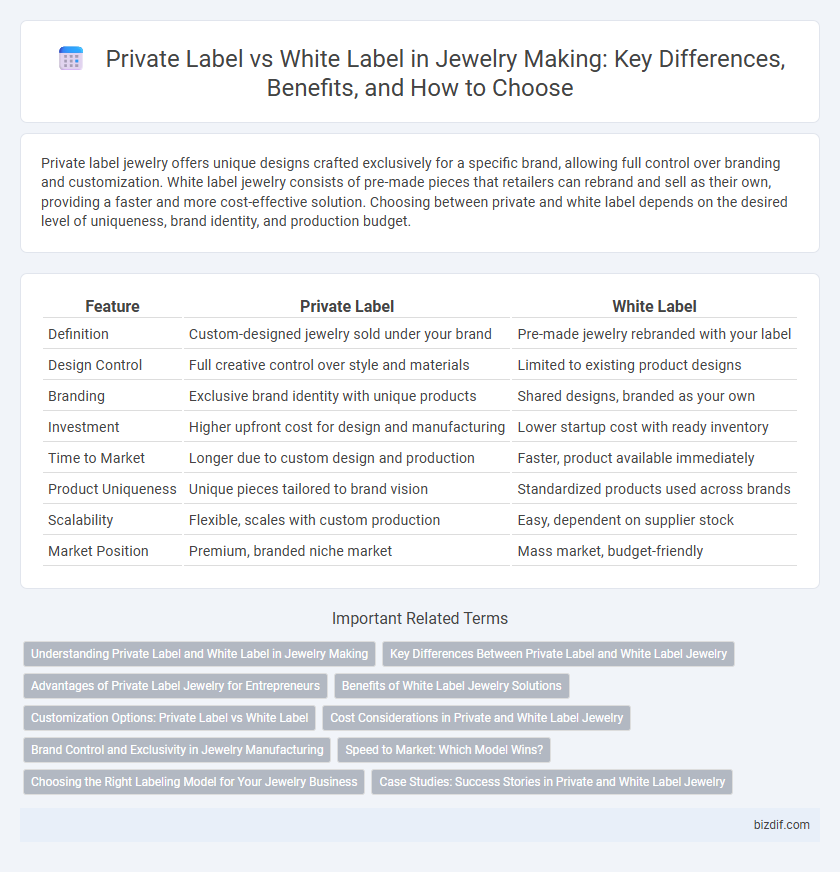Private label jewelry offers unique designs crafted exclusively for a specific brand, allowing full control over branding and customization. White label jewelry consists of pre-made pieces that retailers can rebrand and sell as their own, providing a faster and more cost-effective solution. Choosing between private and white label depends on the desired level of uniqueness, brand identity, and production budget.
Table of Comparison
| Feature | Private Label | White Label |
|---|---|---|
| Definition | Custom-designed jewelry sold under your brand | Pre-made jewelry rebranded with your label |
| Design Control | Full creative control over style and materials | Limited to existing product designs |
| Branding | Exclusive brand identity with unique products | Shared designs, branded as your own |
| Investment | Higher upfront cost for design and manufacturing | Lower startup cost with ready inventory |
| Time to Market | Longer due to custom design and production | Faster, product available immediately |
| Product Uniqueness | Unique pieces tailored to brand vision | Standardized products used across brands |
| Scalability | Flexible, scales with custom production | Easy, dependent on supplier stock |
| Market Position | Premium, branded niche market | Mass market, budget-friendly |
Understanding Private Label and White Label in Jewelry Making
Private label jewelry involves designing unique pieces crafted specifically for a brand, allowing complete customization and exclusive branding rights. White label jewelry consists of pre-made designs that manufacturers supply to multiple retailers, enabling faster market entry with minimal design investment. Understanding these distinctions helps jewelers choose between originality and convenience to best fit their business strategy.
Key Differences Between Private Label and White Label Jewelry
Private label jewelry involves custom-designed pieces created exclusively for a brand, allowing unique branding and control over design, materials, and packaging. White label jewelry consists of pre-made products manufactured by a third party, which multiple retailers can rebrand and sell as their own, offering faster market entry but less uniqueness. The key difference lies in customization and exclusivity, with private label providing tailored products and white label delivering ready-to-sell items.
Advantages of Private Label Jewelry for Entrepreneurs
Private label jewelry allows entrepreneurs to create unique, customized designs that align with their brand identity, enhancing customer loyalty and differentiation in a competitive market. By owning exclusive rights to the products, sellers can control pricing strategies and build long-term brand equity. This approach reduces dependence on generic products and fosters a stronger connection with target audiences through personalized marketing.
Benefits of White Label Jewelry Solutions
White label jewelry solutions allow businesses to quickly enter the market with customizable, pre-designed collections that save time and reduce production costs. These offerings provide scalability and flexibility, enabling retailers to focus on branding and marketing without the challenges of manufacturing. White label partnerships enhance product variety and speed to market, boosting competitive advantage in the jewelry industry.
Customization Options: Private Label vs White Label
Private label jewelry offers extensive customization options, allowing designers to create unique pieces with exclusive materials, branding, and packaging tailored to specific market needs. White label jewelry provides pre-designed templates with limited customization, focusing on quick market entry with standard branding elements. Choosing private label supports brand differentiation, while white label streamlines production with minimal design adjustment.
Cost Considerations in Private and White Label Jewelry
Private label jewelry typically involves higher upfront costs due to customization, exclusive designs, and branding control, making it ideal for businesses seeking brand differentiation. White label jewelry offers lower initial investment as products are pre-designed and sold by multiple retailers, reducing design and development expenses. Cost considerations should include production scale, marketing strategies, and long-term brand equity when choosing between private and white label options.
Brand Control and Exclusivity in Jewelry Manufacturing
Private label jewelry manufacturing offers complete brand control, allowing designers to customize every aspect from materials to design, ensuring unique and exclusive collections. White label jewelry, while quicker to market, provides limited customization options and often results in less brand differentiation due to shared designs among multiple sellers. Prioritizing private label manufacturing enhances exclusivity and strengthens brand identity in the competitive jewelry market.
Speed to Market: Which Model Wins?
Private label jewelry offers faster speed to market by allowing brands to customize designs directly with manufacturers, reducing lead times compared to white label models that provide ready-made products with minimal customization. White label jewelry typically involves longer approval cycles and less flexibility, which can delay product launches in highly competitive markets. For businesses prioritizing rapid product introduction, private label models deliver greater agility and quicker turnaround times.
Choosing the Right Labeling Model for Your Jewelry Business
Choosing the right labeling model for your jewelry business depends on factors such as brand identity, customization needs, and budget constraints. Private label allows full brand ownership and exclusive designs, ideal for businesses seeking unique collections and strong brand differentiation. White label offers ready-made products with minimal customization, enabling faster market entry and lower upfront costs, suitable for startups or businesses testing new product lines.
Case Studies: Success Stories in Private and White Label Jewelry
Private label jewelry brands like Mejuri have thrived by combining unique designs with strong brand storytelling, attracting loyal customers and commanding premium prices. White label companies such as Stuller leverage established product lines to quickly enter the market, focusing on customization and distribution efficiency for jewelers. Case studies reveal that private labels excel in brand differentiation and customer engagement, while white label models prioritize scalability and operational simplicity.
Private Label vs White Label Infographic

 bizdif.com
bizdif.com